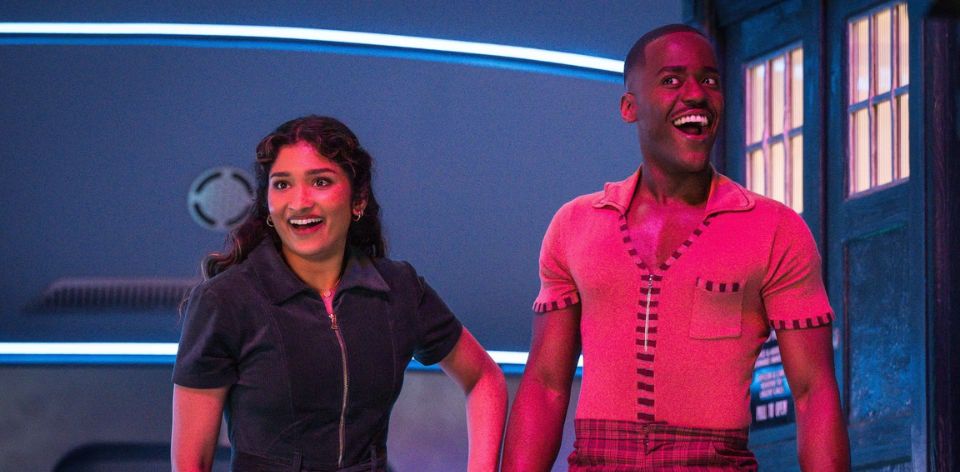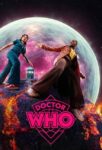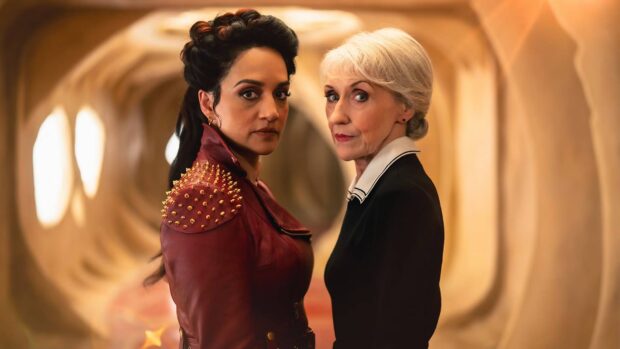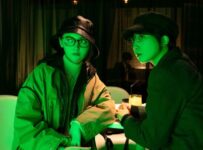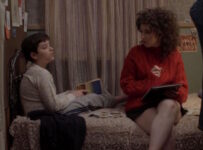WARNING: This review can’t help but discuss a few spoilers, sweeties. Proceed with caution.
Ncuti Gatwa’s second full season as the Doctor does two things almost immediately. The first is expected: Gatwa settles confidently into the role, his energy and charm now fully aligned with the character. The second is more troubling, and perhaps emblematic of Russell T. Davies’ second era—it looks back. Through callbacks, recycled plot points, and direct sequels, DOCTOR WHO’s second full Disney+ season spends a surprising amount of time revisiting its own past.
Take the season opener, The Robot Revolution. It introduces new companion Belinda Chandra (Varada Sethu), a nurse, in strikingly familiar fashion: abducted by aliens and imprisoned by an AI on a star named after her. It’s hard not to think of Martha Jones’ debut alongside the Tenth Doctor. Sethu—who made her WHO debut last year as Mundy Flynn in Boom—proves a perfect companion: forthright, questioning, and initially unwilling to take the Doctor at face value. The episode itself offers a lightweight commentary on male entitlement—complete with Gatwa’s wry “planet of the incels” quip—but mostly serves to lay the groundwork for the season arc.
Unable to return home to the date they left—a classic WHO trope and one of the great sci-fi conceits—the Doctor begins to suspect something’s wrong with Earth. Using this as a springboard, he and Belinda bounce through time and space collecting data and having mostly one-off adventures. Well, I say “one-off,” but few of the season’s eight episodes go without a direct nod to the past.
Lux plays like a remix of the previous season’s The Devil’s Chord, even reusing some of its sets. Its rubber-band animation is striking, but like Dot and Bubble before it, its commentary on racial segregation is buried beneath stylistic flourishes. The Well, by contrast, is a standout—a taut horror outing showcasing deaf representation with Rose Ayling-Ellis in a central role. That said, even this is slightly undercut by the late reveal that it’s a direct sequel to 2008’s Midnight.
Lucky Day and The Story & the Engine are possibly two of the more successful episodes of the season. Millie Gibson returns as Ruby Sunday in a Doctor-lite episode that is ultimately a timely exploration of toxic online vitriol and misinformation. Subtle it is not, but writer Pete McTighe gives both Gibson and the show some time to explore the fringes of the world. The Story & the Engine, written by Nigerian-born British poet and playwright Inua Ellams, is a wonderfully intriguing meta-commentary on the nature of storytelling. Gatwa shines in this episode, one that also features a welcome cameo from Jo Martin as the Fugitive Doctor.
Yet it’s hard to escape the feeling that this season feels almost apologetically shackled to the past. Davies has always had a taste for cutesy aliens and pop culture riffs, but the years may have worn down the novelty. What once felt fresh and irreverent now teeters on the edge of schtick—a greatest hits tour when the audience is ready for a bold new album. The Interstellar Song Contest, for instance, follows in the footsteps of 2005’s Bad Wolf, disguising a major narrative turn beneath layers of pop cultural nods.
The two-part finale also marks the return of the Rani, a rogue Time Lord last seen in a smattering of classic episodes and specials decades ago. In a bold—if convoluted—move, the enigmatic Mrs Flood (Anita Dobson) bigenerates into two versions of the character, one of them a new incarnation played by Archie Panjabi. It’s a reveal clearly designed to set up future storylines, but from a storytelling perspective, the ground is getting shaky. Russell T Davies has now used this supposedly rare deus ex machina twice in 18 months to wedge in major lore shifts. For newer fans, the sudden reappearance of the Rani—swiftly followed by a hefty Omega reference—may land as whiplash rather than wonder. Yet for us older fans, there’s a certain giddy thrill to these episodes, and a momentum that’s hard to resist.
Every year, someone declares the death of DOCTOR WHO but we’re over 60 years and they keep finding new ways of regenerating. The bigger Disney budgets are evident, and there are as many misses as there are hits in any given season. Gatwa is unquestionably one of the best Doctors, and will be remembered as such – and I was definitely hoping he could continue to build this character in a third season. Yet RTD saved his biggest surprises for last, but even that was a dip back into his own past.
2025 | UK | DIRECTORS: Peter Hoar, Amanda Brotchie, Makalla McPherson, Ben A. Williams, Alex Sanjiv Pillai | CREATORS/WRITERS: Russell T Davies (also showrunner), Sharma Angel-Walfall, Pete McTighe, Juno Dawson | CAST: Ncuti Gatwa, Varada Sethu, Anita Dobson, Archie Panjabi, Millie Gibson | DISTRIBUTOR: BBC One, Disney+ | EPISODES: 8

